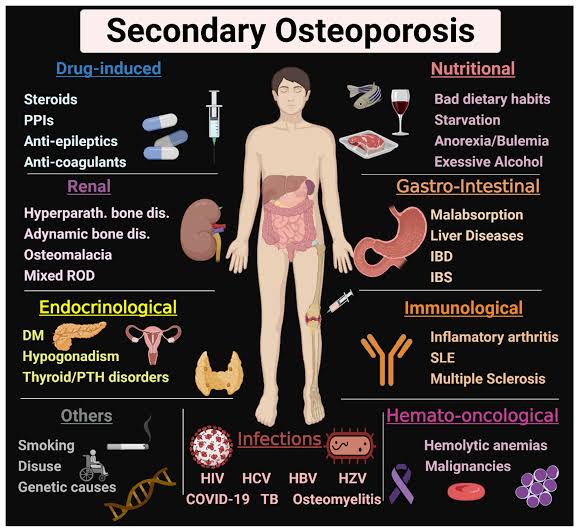
Osteoporosis
Osteoporosis can be defined as one of the health problems represented by a decline or lack of bone density. This disease affects the structure and composition of bones in a negative way, which increases the chance of suffering from fractures. Most of these fractures occur in the hips, or The spine, or the wrists, and this problem can affect men and women. It is worth noting that this disease is one of the common health problems. Based on the statistics conducted, it was found that approximately 53 million people in the United States of America suffer from this problem.
Causes of osteoporosis
Bones are in a continuous process of renewal, as new bones are manufactured in exchange for old bones that were destroyed. It is worth noting that the process of building bones is faster than the process of destroying them in the early stages of life, and this is what causes an increase in bone mass. It is worth noting that the maximum bone mass is reached by The body is in its early twenties, but as a person ages, the rate of destruction becomes higher than the rate of construction, and from here it can be said that the presence of some risk factors under these circumstances causes an increased chance of developing osteoporosis, and the risk factors can be detailed as follows:
controllable factors
There are some factors that increase the chance of developing osteoporosis, and fortunately, most of them can be controlled, and these factors can be summarized as follows:
• The nature of the food: The nature of the food can affect the appearance of osteoporosis, and it is worth noting that there are some foods that are very beneficial for bone health and important for building them, and therefore eating them reduces the risk of osteoporosis, and on the other hand, there are some foods that eating them in excess causes By increasing the chance of developing osteoporosis, the risk factors related to nutrients can be stated as follows: ◦Lack of calcium intake, as it has been shown that this element is important for bone growth and maintaining their health.
◦Lack of vitamin D intake; This vitamin helps increase the absorption of calcium in the body.
◦ Food lack of the following nutrients: vitamin B12, magnesium, phosphorus, and vitamin K, all of these elements are important for bone health.
◦ Excessive intake of foods rich in protein, despite the importance of protein for the health of the body, but the frequent intake of protein derivatives from animal sources causes a lack of calcium absorption.
◦ Excessive intake of products containing caffeine; This is because too much caffeine impairs the absorption of calcium and increases its excretion rate in the urine.
◦ Excessive sodium intake; This causes large amounts of calcium to be excreted through the kidneys.
• Inactivity and lack of exercise: It has been shown that exercise clearly helps to build bones and increase their strength, and therefore inactivity necessarily leads to weak bones and an increase in the chance of osteoporosis.
• Hormonal disorders: The chance of developing osteoporosis increases in people who suffer from low or high levels of some hormones, and this is explained below: ◦ Low levels of sexual hormones, such as estrogen and testosterone; It has been shown that this plays an important role in increasing the chance of suffering from osteoporosis, and it is worth noting that estrogen decreases for a number of reasons, including undergoing some types of breast cancer treatments, and reaching menopause. As for the low level of testosterone, it is usually attributed to advancing age. As the level of this hormone decreases gradually as the person gets older, and other reasons that reduce the level of this hormone: undergoing treatment for prostate cancer.
Infection with some health problems: There are some disorders and health problems that cause the patient to suffer from osteoporosis, and they can be summarized as follows: ◦ Bowel problems: such as wheat allergy, which is scientifically known as celiac disease, and inflammatory bowel disease (in English: inflammatory). bowel disease), as these health problems affect the body’s ability to absorb calcium and vitamin D.
◦ Kidney disease: This is due to weak activation of vitamin D.
◦ Problems of the thyroid gland and parathyroid glands: Suffering from hyperactivity of the parathyroid glands (in English: Hyperparathyroidism), which is represented by excessive parathyroid secretion of its hormones, can lead to the withdrawal of calcium from the blood, which increases the chance of suffering from osteoporosis, and on the other hand it was found that Hyperthyroidism causes an increased chance of bone loss, which leads to osteoporosis.
Taking some types of medications: Although some medications may cause osteoporosis, this does not mean abstaining from it. Rather, it is worth following the doctor’s advice and instructions on the correct way to take them and whether a person needs to take some supplements. Examples of these medications include:
◦ Glucocorticoids, such as prednisone and cortisone.
◦ Some medications used to treat epilepsy.
◦ Proton pump inhibitors, which are given in many cases, including: indigestion.
◦ An aromatase inhibitor, which is given in some cases of breast cancer.
• Drinking alcohol: It has been found that drinking alcohol increases the risk of suffering from osteoporosis.
• Smoking: Although it is not understood how smoking affects the risk of osteoporosis, this fact is proven.
Uncontrollable factors
There are some factors that increase the chance of suffering from osteoporosis, but they cannot be controlled or changed, as follows:
• Gender: It was found that women are more likely to suffer from osteoporosis than men.
• Age: The chance of developing osteoporosis increases with age.
• Race: The highest rates of osteoporosis were among whites and people of Asian race.
• Family history: The injury of one of the parents or siblings with osteoporosis increases the chance of a person suffering from this problem, especially if one of the parents had fractures in the hips.






